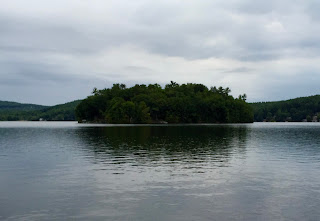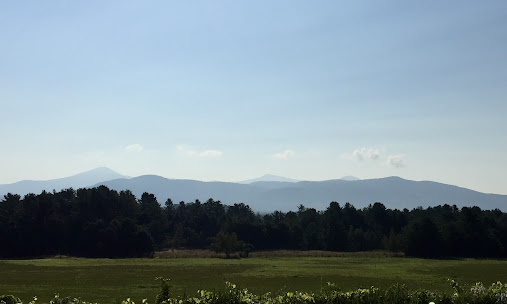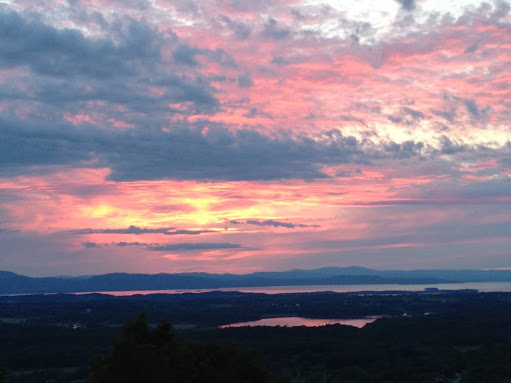The year is but a succession of days,
and I see that I could assign some office to each day
which, summed up, would be the history of the year.
Henry Thoreau, August 24, 1852
Evening draws on
lengthening the shadows and
smoothing the waters . . .
This hour of the day
each sound has a broad and deep
relief of silence.
The pensive season –
At early evening the poet
collects his thoughts.
August 15, 2015
I have heard since the 1st of this month the steady creaking cricket. August 11, 1854
Instead of dog-day clouds and mists, we have a rainy season. You must walk armed with an umbrella. August 11, 1858
Platanthera blephariglottis, white fringed orchis. August 11, 1852.
Platanthera blephariglottis, white fringed orchis. August 11, 1852.
Cyperus strigosus; how long? August 11, 1860
Some naked viburnum berries are red. The sweet viburnum turning. August 11, 1852
Some naked viburnum berries are red. The sweet viburnum turning. August 11, 1852
Red cohosh berries well ripe in front of Hunt's, perhaps a week or more, - a round, conical spike, two and a half inches long by one and three quarters, of about thirty cherry-red berries. August 11, 1857
This side of Hubbard's Meadow Bridge, Lespedeza hirta (hairy), Cannabis sativa, apparently out. August 11, 1852
Aster Tradescanti, two or three days in low ground; flowers smaller than A. dumosus, densely racemed. August 11, 1854
Aster corymbosus, path beyond Corner Spring and in Miles Swamp. August 11, 1852 .
I see some Hypericum angulosum turned a delicate clear purple. August 11, 1856
A new sunflower at Wheeler's Bank, this side Corner Spring, which I will call the tall rough sunflower; opened say August 1st (?). (I saw it out the 7th.) It does not correspond exactly to any described. August 11, 1856.
See a small variety of helianthus growing with the divaricatus, on the north side of Peter’s path, two rods east of bars southeast of his house. It is an imperfect flower, but apparently answers best to the H. tracheliifolius. August 11, 1858
Also the small rough sunflower (now abundant) August 11, 1858
There is evidently a great variety in respect to form, petiole, venation, roughness, thickness, and color of the leaves of helianthuses. August 11, 1858.
The birches have lately lost a great many of their lower leaves, which now cover and yellow the ground. August 11, 1858
I meet with many a clam which comes floating down in midstream, nicely poised on the water with its pearly concave side uppermost. These have been opened and left by the musquash during the night on the shore, or often on rocks in the stream, and now the water rising gently sets them afloat,. . . a pearly skiff set afloat by the industrious millers. August 11, 1859.
What shall we name this season? — this very late afternoon, or very early evening, this season of the day most favorable for reflection, after the insufferable heats and the bustle of the day are over and before the twilight? The serene hour, the season of reflection! The pensive season. August 11, 1853
The few sounds now heard, far or near, are delicious. Each sound has a broad and deep relief of silence. It is not more dusky and obscure, but clearer than before. The poet arouses himself and collects his thoughts. August 11, 1853July 26, 1853 ("This the afternoon of the year. How apt we are to be reminded of lateness, even before the year is half spent!”)
The skunk-cabbage leaves are fallen and decaying, and their fruit is black. Their fall is earlier than that of other plants. August 11, 1852
The birches have lately lost a great many of their lower leaves, which now cover and yellow the ground. August 11, 1858
I notice a new growth of red maple sprouts, small reddish leaves surmounting light-green ones, the old being dark-green. August 11, 1854
I meet with many a clam which comes floating down in midstream, nicely poised on the water with its pearly concave side uppermost. These have been opened and left by the musquash during the night on the shore, or often on rocks in the stream, and now the water rising gently sets them afloat,. . . a pearly skiff set afloat by the industrious millers. August 11, 1859.
The autumnal ring of the alder locust.August 11, 1852
I see of late a good many young sparrows (and old) of different species flitting about. That blackberry-field of Gowing’s in the Great Fields, this side of his swamp, is a famous place for them. I see a dozen or more, old and young, perched on the wall. As I walk along, they fly up from the grass and alight on the wall, where they sit on the alert with outstretched necks. Nearest and unalarmed sit the huckleberry-birds; next, quite on the alert, the bay-wings. August 11, 1858
Heard a fine, sprightly, richly warbled strain from a bird perched on the top of a bean-pole. It was at the same time novel yet familiar to me. I soon recognized it for the strain of the purple finch, which I have not heard lately. But though it appeared as large, it seemed a different-colored bird. With my glass, four rods off, I saw it to be a goldfinch. It kept repeating this warble of the purple finch for several minutes . . . I conclude that the goldfinch is a very fine and powerful singer, and the most successful and remarkable mocking-bird that we have. August 11, 1858
In the spring I heard it imitate the thrasher exactly, before that bird had arrived, and now it imitates the purple finch as perfectly, after the latter bird has ceased to sing! It is a surprising vocalist. It did not cease singing till I disturbed it by my nearer approach, and then it went off with its usual mew, succeeded by its watery twitter in its ricochet flight. Have they not been more common all summer than formerly? August 11, 1858
I see of late a good many young sparrows (and old) of different species flitting about. That blackberry-field of Gowing’s in the Great Fields, this side of his swamp, is a famous place for them. I see a dozen or more, old and young, perched on the wall. As I walk along, they fly up from the grass and alight on the wall, where they sit on the alert with outstretched necks. Nearest and unalarmed sit the huckleberry-birds; next, quite on the alert, the bay-wings. August 11, 1858
Heard a fine, sprightly, richly warbled strain from a bird perched on the top of a bean-pole. It was at the same time novel yet familiar to me. I soon recognized it for the strain of the purple finch, which I have not heard lately. But though it appeared as large, it seemed a different-colored bird. With my glass, four rods off, I saw it to be a goldfinch. It kept repeating this warble of the purple finch for several minutes . . . I conclude that the goldfinch is a very fine and powerful singer, and the most successful and remarkable mocking-bird that we have. August 11, 1858
In the spring I heard it imitate the thrasher exactly, before that bird had arrived, and now it imitates the purple finch as perfectly, after the latter bird has ceased to sing! It is a surprising vocalist. It did not cease singing till I disturbed it by my nearer approach, and then it went off with its usual mew, succeeded by its watery twitter in its ricochet flight. Have they not been more common all summer than formerly? August 11, 1858
I smell the fragrant everlasting concealed in the higher grass and weeds there, some distance off. It reminds me of the lateness of the season. August 11, 1858
Evening draws on while I am gathering bundles of pennyroyal on the further Conantum height. I find it amid the stubble mixed with blue-curls and, as fast as I get my hand full, tie it into a fragrant bundle. August 11, 1853
Evening draws on, smoothing the waters and lengthening the shadows . . . each sound and sight has acquired ineffable beauty. . . A thousand little cavities are filling with coolness. August 11, 1853
Evening draws on, smoothing the waters and lengthening the shadows . . . each sound and sight has acquired ineffable beauty. . . A thousand little cavities are filling with coolness. August 11, 1853
Hills and the least inequalities in the ground begin to cast an obvious shadow. The shadow of an elm stretches quite across the meadow. From far over the pond and woods I hear a farmer calling loudly to his cows, in the clear still air, "Ker, ker, ker, ker. August 11, 1853
What shall we name this season? — this very late afternoon, or very early evening, this season of the day most favorable for reflection, after the insufferable heats and the bustle of the day are over and before the twilight? The serene hour, the season of reflection! The pensive season. August 11, 1853
The few sounds now heard, far or near, are delicious. Each sound has a broad and deep relief of silence. It is not more dusky and obscure, but clearer than before. The poet arouses himself and collects his thoughts. August 11, 1853
.
July 26, 1856 ("Arranged the hypericums in bottles this morning and watched their opening. The H. angulosum has a pod one-celled (with three parietal placentae), conical, oblong, acute, at length longer than the sepals, purple.”)
July 31, 1857 ("I also saw here [the East Branch] the red cohosh berries, ripe, (for the first time in my life")
August 1, 1852 ("The small rough sunflower (Helianthus divaricatus) tells of August heats”);
August 4, 1854 ("Cannabis sativa")
July 31, 1857 ("I also saw here [the East Branch] the red cohosh berries, ripe, (for the first time in my life")
August 1, 1852 ("The small rough sunflower (Helianthus divaricatus) tells of August heats”);
August 4, 1854 ("Cannabis sativa")
August. 8, 1855 ("Blue-curls, how long? Not long. ")
August 8, 1858 ("I find at Ledum Swamp, near the pool, the white fringed orchis, quite abundant but past prime, only a few, yet quite fresh. It seems to belong to this sphagnous swamp and is some fifteen to twenty inches high, quite conspicuous, its white spike, amid the prevailing green. The leaves are narrow, half folded, and almost insignificant. It loves, then, these cold bogs.”)
August 8, 1858 ("I find at Ledum Swamp, near the pool, the white fringed orchis, quite abundant but past prime, only a few, yet quite fresh. It seems to belong to this sphagnous swamp and is some fifteen to twenty inches high, quite conspicuous, its white spike, amid the prevailing green. The leaves are narrow, half folded, and almost insignificant. It loves, then, these cold bogs.”)
August 9, 1851 (“The Trichostema dichotomum is quite beautiful now in the cool of the morning”)
August 9, 1856 ("What I have called Aster corymbosus out a day, above Hemlocks.")
August 10, 1853 ("Small rough sunflowers, six feet high, with many branches and flowers.")
August 10, 1856 ("Fragrant everlasting, maybe some days.”)
August 10, 1856 ("Aster dumosus and pennyroyal out; how long?")
August 10, 1856 ("Aster dumosus and pennyroyal out; how long?")
Since first of August
the steady creaking cricket,
early potatoes.
August 12, 1851 ("Now the great sunflower’s golden disk is seen.")
August 12, 1854 ("Viburnum nudum berries generally green, but some, higher and more exposed, of a deep, fiery pink on one cheek and light green on the other, and a very few dark purple or without bloom, black already")
August 12, 1856 ("The Aster patens is very handsome by the side of Moore's Swamp on the bank.")
August 12, 1856 (“Am surprised to see still a third species or variety of helianthus (which may have opened near August 1st)”)
August 12, 1856 (“Am surprised to see still a third species or variety of helianthus (which may have opened near August 1st)”)
August12, 1858 ("It is surprising how young birds, especially sparrows of all kinds, abound now.")
August 13, 1860 ("Hear the steady shrill of the alder locust. ")
August 13, 1852 ("Pennyroyal abundant in bloom. I . . .gather a little bundle, which scents my pocket for many days.")
August 13, 1858 ("The dullish-blue or lead-colored Viburnum dentatum berries are now seen, not long, overhanging the side of the river..")
August 13, 1858 ("It has rained more or less at least half the days. You have had to consider each afternoon whether you must not take an umbrella.")
August 13, 1856 (“Is there not now a prevalence of aromatic herbs in prime?. . . Does not the season require this tonic?“)
August 14, 1852 ("Viburnum dentatum berries blue.")
August 14, 1852 ("Viburnum dentatum berries blue.")
August 14, 1853 ("Locust days, — sultry and sweltering. I hear them even till sunset. The usually invisible but far-heard locust.")
August 14, 1856 ("Solidago odora abundantly out.")
August 14, 1856 ("Aster tradescanti, apparently a day or two.")
August 15, 1852 ("That clear ring like an alder locust (is it a cricket ?) for some time past is a sound which belongs to the season.")
August 15, 1852 ("An orchis by the brook under the Cliffs with only three white flowers , only smaller than the fringed white; spurs half an inch long. May it be another species? ")
August 17, 1851 ("The Trichostema dichotomum, — not only its bright blue flower above the sand, but its strong wormwood scent which belongs to the season, –– feed my spirit, endear the earth to me, make me value myself and rejoice.")
August 18, 1853 ("What means this sense of lateness that so comes over one now”)
August 25, 1858 ("Cyperus strigosus under Clamshell Hill, that yellowish fuzzy headed plant, five to twelve inches high, now apparently in prime.")
August 25, 1858 ("Cyperus strigosus under Clamshell Hill, that yellowish fuzzy headed plant, five to twelve inches high, now apparently in prime.")
August 26, 1856 ("I gather a bundle of pennyroyal; it grows largest and rankest high and close under these rocks, amid the loose stones. I tie my bundle with the purple bark of the poke-weed.")
August 31, 1852 ("This is the most glorious part of this day, the serenest, warmest, brightest part, and the most suggestive. . . .Evening is pensive. The serenity is far more remarkable to those who are on the water.")
August 31, 1852 ("This is the most glorious part of this day, the serenest, warmest, brightest part, and the most suggestive. . . .Evening is pensive. The serenity is far more remarkable to those who are on the water.")
If you make the least correctobservation of nature this year,you will have occasion to repeat itwith illustrations the next,and the season and life itself is prolonged.August 10 <<<<< August 11 >>>>> August 12.A Book of the Seasons, by Henry Thoreau, August 11A Book of the Seasons, by Henry Thoreau"A book, each page written in its own season,out-of-doors, in its own locality."~edited, assembled and rewritten by zphx © 2009-2022
tinyurl.com/HDT11AUGUST









No comments:
Post a Comment